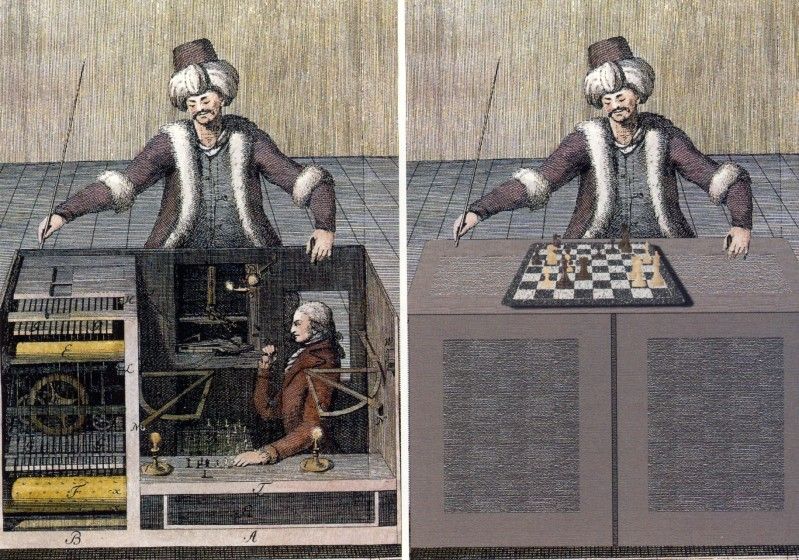Automaton schemes
thoughts born in brass gears turning
metal regicide
Don’t worry, I haven’t invented a Blade Runner style android with the sole purpose of murdering the Royal Family on this diamond jubilee weekend. Rather, I speak of a fantastic hoax, a clever folly of the 18th and 19th centuries, The Mechanical Turk. A chess playing automaton, which fooled the great and the good for several decades.
Secreting a top class chess player, the Turk appeared to be able to play a marvellous game, but also displayed flourishes of temper or humour, depending on the mood and imagination of his controller.
He must’ve captivated and terrified his audiences. And although many suspected something fishy, he wasn’t exposed for several decades.
How did I find out about all this? I watched Horrible Histories for the first time of course. Brilliant TV! Educational and very funny. It also taught me Napoleon (incidentally one of the Turk’s defeated celebrity opponents, along with Benjamin Franklin and Catherine the Great) had piles. A haemorrhoid factoid.
With a bit of googling I found a couple of very interesting articles. This one (linked here - from which I also credit the pic I use of the inner machinations of The Turk) discusses the links between Chess, Sentiency, Consciousness and Artificial Intelligence. Chess is often an entry level bridge into the testing the intelligence of computers. Although the Turk was a hoax, it must’ve provided fuel to the imaginations of early pioneers in computing. What if you could build a machine which could play a decent game of Chess? Chess has set strict rules, but also allows for some level of creativity which goes a little way beyond the ability to compute several million combinations of moves ahead (which is basically what modern chess computers can do, taking the fun away from the important ability to learn and improve).
The article discusses the great Alan Turing and his paper 'Digital computers applied to games' (seemingly incorrectly labelled “Chess” on the website). He talked of a computers ability to learn, from mistakes, from previous games, to become better through it’s own experience, much like an infant learning through life experience.
I quote (from the web article, which quotes Turing’s paper – available in original form on the Turing Archive).
When one is asked, “Could one make a machine to play chess?” there are several possible meanings which might be given to the words. Here are a few–
a) Could one make a machine which would obey the rules of chess, i.e. one which would play random legal moves, or which could tell one whether a given move is a legal one?
(b) Could one make a machine which would solve chess problems, e.g. tell one whether, in a given position, white has a forced mate in three?
(c) Could one make a machine which would play a reasonably good game of chess, i.e. which, confronted with an ordinary (that is, not particularly unusual) chess position, would after two or three minutes of calculation, indicate a passably good legal move?
(d) Could one make a machine to play chess, and to improve its play, game by game, profiting from its experience?
To these we may add two further questions, unconnected with chess, which are likely to be on the tip of the reader’s tongue.
e) Could one make a machine which would answer questions put to it, in such a way that it would not be possible to distinguish its answers from those of a man?
f) Could one make a machine which would have feelings like you and I do? (Alan Turing “Chess”)
End of quote… Back again. e) and f) are the most fascinating and take a real jump from just playing Chess. e) describes the Turing Test. Can you have a conversation with a machine and not realise you are talking to a machine? (I’ve distilled this description down to a basic level, but there are plenty of online resources if you want to read more). This Turing Test was loosely employed when Blade Runners were interrogating potential replicants in Philip K Dick’s “Do Androids Dream of Electric Sheep”, later turned into the film Blade Runner of course.
But f) describes feelings, can this ever be possible for a machine or computer?… Turing considered issues and concepts way beyond the technology available to him, this is from a man who was active more than 50 years ago. It’s teasing and evocative and a theme often employed in Science Fiction, you often see these powerful robots or androids, sensitive and emotionally fragile characters, “born” as adults, endowed with emotion and feeling their way into the world and interacting with these horrible flawed humans with all their needy selfish ways. Poor android bastards. At least give them a chance before exposing them to humans! No wonder they end up killing everyone in these stories!
What’s even more intriguing, to me anyway, is that Turing designed a Chess algorithm. There wasn’t a computer powerful enough for him to programme this algorithm into, but what he was able to do was play a game against a friend where he employed his algorithm, it probably took hours. He lost, but the game was a decent one, a good show. You can follow the first ever “computer vs human” chess game, blow by blow here!

No comments:
Post a Comment